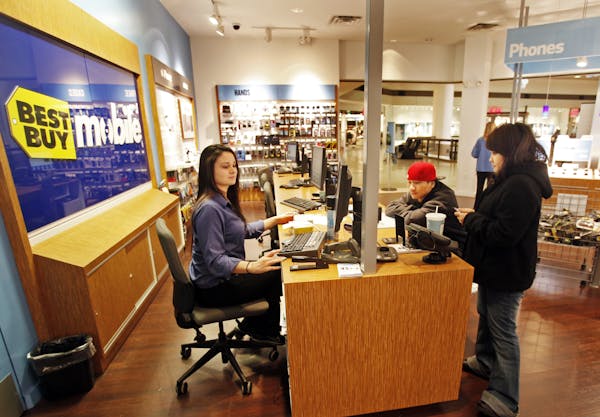With a combination of snazzy new video games, smart-home gadgets and an upbeat consumer ready to splurge, Best Buy Co. reported Thursday that it rang up its best holiday season in 14 years.
The nation's largest consumer electronics retailer said that same-store sales grew 9 percent during the fourth quarter, a stunning jump aided by rising consumer confidence, well-stocked shelves and fewer competitors.
"The company was firing on all cylinders," said Hubert Joly, the company's chairman and chief executive.
It was the strongest three-month performance since the fourth quarter of 2004.
Net income fell 40 percent during the period ending Feb. 3, however, because the Richfield-based company paid performance bonuses to more than 85,000 employees and faced costs associated with the new U.S. tax law.
The company made $364 million, or $1.23 a share, in the three months ended Feb. 3, down from $607 million, or $1.91 a share, a year earlier.
Adjusted for one-time gains and costs, earnings per share were $2.42, a bump of 26 percent that far outpaced the $2.05-per-share projections from analysts, according to Zacks Investment Research.
Revenue in the quarter was $15.4 billion, up 14 percent.
Best Buy said it expects same-store sales to grow 1.5 to 2.5 percent in the first quarter of its new fiscal year, a pace that is strong but far more normal for an established retailer.
The forecast also reflects the seasonal drop-off in demand for electronics in comparison to the just-finished quarter that includes the holidays and pre-Super Bowl period.
Shares closed the day Thursday up 4 percent to $75.30.
"Customers are responding very positively to our Best Buy 2020 strategy," Joly said. He added that efforts to improve the in-store experience, decrease employee turnover and increase training played a role.
Neil Saunders, managing director of GlobalData Retail, said a strong lineup of mobile phones, gaming devices and home theater products helped stimulate demand.
"As much as strong consumer confidence aids electronics sales, it is useless unless there are products people want to buy," Saunders said in a report.
Smart speakers and a growing number of connected home products proved popular as gifts and self-purchases.
"Fortunately for Best Buy," Saunders noted, "many of these items need explanation and demonstration, particularly among the less tech-savvy. This helped make its stores the first port of call."
The results came a day after Best Buy announced it will close 250 of its free-standing Best Buy mobile stores. The decision — which Joly said is part of a strategy of "continuous optimization" — will mean a tax restructuring hit of up to $56 million.
The stores — most of which are in shopping malls, and at 1,400 square feet are much smaller than Best Buy's 40,000-square-foot big-box stores — have become less profitable for the Richfield-based electronics chain.
The company reported continued strength in U.S. online sales, which rose 18 percent for the quarter. Online sales added $2.8 billion in revenue, the company's highest to date.
Moody's retail analyst Charlie O'Shea said in a note to investors that while online growth for the full fiscal year was down slightly, the revenue "speaks to the strength of Best Buy's brick-and-mortar footprint, as well as reinforces our view that consumers still value the store experience."
While Best Buy continues to face pressure from Amazon, Walmart, Target and other retailers that sell consumer electronics, it has outdistanced several rivals.
Privately held HHGregg Inc., announced last spring it would close all stores in 20 states, and RadioShack filed for Chapter 11 bankruptcy and shuttered more than 1,000 stores last year.
Additionally, the company is in position to gain from the decline of Sears, which announced in January it would close 100 more stores this year, said Saunders of GlobalData Retail.
Best Buy's sales of higher-margin appliances rose by nearly 21 percent, as millennials stock their homes and help fuel a robust housing market.
With a windfall tied to lower corporate tax rates, the retailer handed out bonuses of $1,000 to full-time employees and $500 to part-timers, many of them front-line workers at its stores. Joly hedged when asked by reporters whether the company expects a bump in sales as consumers see more in their paychecks, as many backers of the Republican plan predict.
"In terms of forecasting the trickle down, we're not in the best position to answer that question," Joly said. "What we can say for sure is that the consumer is in good shape, generally speaking. They're excited by technology."
Joly noted that consumer confidence is as high as it has been since 2000. The focus, he said, remains on improving the customer experience online and in stores, as well as expanding services, such as its in-home consultations. The company aims to leverage its Geek Squad expertise in stores and through a new program where employees meet one-on-one with consumers in their homes to help integrate their growing array of gadgets and put them to better use.
The strategy requires more investment in training and a slower rollout, which means a longer wait to see a payoff in higher sales, Joly said. Best Buy now has about 375 consultants in its home consultation program.
For the new fiscal year, Best Buy executives expect sales to be flat to 2 percent higher. Operating income also is expected to be flat. They expect earnings per share to rise 9 percent to 13 percent, driven by a lower tax rate and share repurchasing. Adjusted earnings are forecast to fall between $4.80 and $5 a share in the year ahead.
Jackie Crosby • 612-673-7335 Twitter: @JackieCrosby

